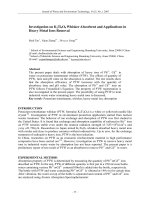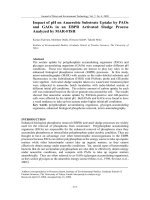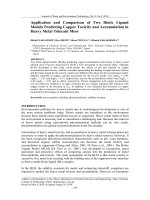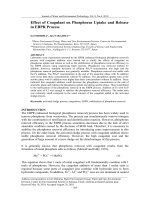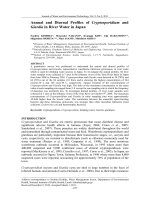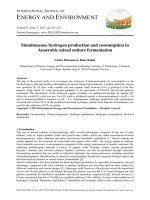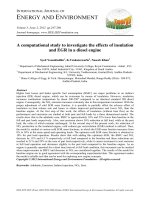- Trang chủ >>
- Khoa Học Tự Nhiên >>
- Vật lý
political authority and obligation in aristotle may 2005
Bạn đang xem bản rút gọn của tài liệu. Xem và tải ngay bản đầy đủ của tài liệu tại đây (2.74 MB, 313 trang )
POLITICAL AUTHORITY AND OBLIGATION IN
ARISTOTLE
OXFORD ARISTOTLE STUDIES
General Editors
Julia Annas and Lindsay Judson
Other titles in the series
Aristotle on Meaning and Essence
David Charles
Aristotle's Theory of Substance
The Categories and Metaphysics Zeta
Michael V. Wedin
Order in Multiplicity
Homonymy in the Philosophy of Aristotle
Christopher Shields
Aristotle's De Interpretatione
Contradiction and Dialectic
C. W. A. Whitaker
On Location
Aristotle's Concept of Place
Benjamin Morison
Political Authority and Obligation in Aristotle
ANDRÉS ROSLER
CLARENDON PRESS • OXFORD
Great Clarendon Street, Oxford
OX
26
DP
Oxford University Press is a department of the University of Oxford.
It furthers the University's objective of excellence in research, scholarship,
and education by publishing worldwide in
Oxford New York
Auckland Cape Town Dar es Salaam Hong Kong Karachi Kuala Lumpur
Madrid Melbourne Mexico City Nairobi New Delhi Shanghai Taipei
Toronto
With offices in
Argentina Austria Brazil Chile Czech Republic France Greece
Guatemala Hungary Italy Japan South Korea Poland Portugal
Singapore Switzerland Thailand Turkey Ukraine Vietnam
Oxford is a registered trade mark of Oxford University Press
in the UK and in certain other countries
Published in the United States
by Oxford University Press Inc., New York
© Andrés Rosler 2005
The moral rights of the authors have been asserted
Database right Oxford University Press (maker)
First published 2005
All rights reserved. No part of this publication may be reproduced,
stored in a retrieval system, or transmitted, in any form or by any means,
without the prior permission in writing of Oxford University Press,
or as expressly permitted by law, or under terms agreed with the appropriate
reprographics rights organization. Enquiries concerning reproduction
outside the scope of the above should be sent to the Rights Department,
Oxford University Press, at the address above
You must not circulate this book in any other binding or cover
and you must impose this same condition on any acquirer
British Library Cataloguing in Publication Data
Data available
Library of Congress Cataloging in Publication Data
Rosler, Andrés.
Political authority and obligation in Aristotle / Andrés Rosler.
p. cm.
Includes bibliographical references and index.
1. Aristotle. 2. Political obligation. 3. Authority. 4. Political science — Philosophy.
I. Title.
JC71. A7R67 2005 302'. 01—dc22 2004025226
ISBN 0–19–925150–9
13579108642
For my parents
This page intentionally left blank
Preface and Acknowledgements
The purpose of this book is to argue that, in spite of the prevailing view to the contrary, Aristotle does examine the
question of political obligation and its limits. To prove this point some connected issues will be tackled as well, such as
the ethical underpinning of Aristotle's political thought, the normativity of his ethical and political theory, and the
concepts of political authority and obligation itself.
It is true that Aristotle does not discuss these topics systematically in particular chapters devoted to them. Actually, it
looks as though Aristotle's books on practical philosophy that have come down to us are mainly the result of
assembling some, as it were, ‘ready-to-go-to-press’ materials together with lecture notes and/or papers written to be
looked up at the library of the school. Furthermore, there is no question that his main interests, challenges, and
opponents were generally different from the usual modern ones. But I believe there is still a case for arguing that he
does not fail to make an issue of topics which are thought to be particularly modern ones, such as political authority
and obligation.
A brief perusal of its index will show that this study straddles the usual academic division of labour between the history
of philosophy and contemporary moral, political, and legal philosophy. As a result of our departamentalized view of
the academic business it is not unusual for classical scholars to work with a stereotypical or outdated picture of modern
political philosophy, and something similar applies to modern moral and political theorists as they deal with classical
thought. Furthermore, scholars pursuing the study of classical and modern philosophy often overlook the findings of
their colleagues involved in contemporary philosophy. Perhaps a comparative study focused on the analysis of what
appears to be a mainly modern and contemporary issue in a classical thinker may contribute something of value to
most of the fields at stake.
Since the structure of this book is designed to meet several arguments against its principal thesis, those who are
unimpressed by some of these arguments may want to pass over the sections where the latter are dealt with. Of course,
I would be delighted if somebody wanted to see new or different arms and tactics deployed against old or familiar
enemies, let alone if the book were read from start to finish. Nevertheless, readers
may be happy to know that, for instance, those who are not worried about the normative credentials or the
foundations of Aristotle's ethical and political naturalism may want to skip Chapter
2 altogether—mind you, this caveat
does not apply to those interested in the way the foundation of Aristotle's ethical and political thought stands
vis-à-vis
Hobbes's and Kant's. In a similar sense, those who are willing to ascribe the notion of morality to Aristotle may have
reason to omit the first three sections as they read through Chapter
4. At any rate, readers should feel free to help
themselves to whatever they find of interest in this book.
An earlier and rather different version of this work was submitted as a doctoral dissertation at Oxford in Hilary Term
1999. My sincere thanks must first go to my supervisor, John Finnis, whose meticulous readings of and insightful
critical comments on several drafts improved my dissertation greatly. In fact, I seem to remember that this whole
adventure into Aristotelian territory started off one afternoon in early October 1994 in his room at University College,
as he subtly suggested that I put off my Hobbesian interests for a while and explore instead the possibilities of
ascribing the notion of political obligation to Aristotle. I hope the reader will agree that he was right.
I would also like to thank my D.Phil. examiners, John Gardner and Mark Philp, who proved to be ideal for the job of
conducting the
viva voce. They made a number of helpful criticisms on and observations to my thesis and were
instrumental in motivating me to develop my dissertation in a published form. Regarding this last point, I should single
out John Gardner's help and support. It should be added that Mark Philp had also served as examiner during my
transfer to the D.Phil. status, together with David Charles. Their sharp and uncompromising criticisms as stated in the
transfer report prodded me to raise significantly the standard of my dissertation.
During my stay at Oxford I was lucky enough to be a member of and enjoy the friendly atmosphere at St Hugh's
College. My gratitude goes to Ann Smart, for her help and kindness during my first year at St Hugh's, and especially to
Joshua Getzler, who was my graduate tutor all along. They both made me feel quite at home.
The financial support of the British Council during my first year at St Hugh's, and of the Fundación Antorchas during
my second and third years of graduate work in addition to a postdoctoral research fellowship, is also gratefully
acknowledged.
Any work in philosophy, especially one which is at the crossroads of the history of philosophy and contemporary
philosophy, is bound to be heavily indebted to the work of many others. The footnotes throughout the book should
acknowledge my many intellectual debts, especially to
viii
Aristotelian scholarship. But there is one study which requires special mention: Fred D. Miller, Jr.'s Nature, Justice, and
Rights in Aristotle's Politics
. Although it came out as my second year as a graduate student was well under way, I have
learned much from the structure and content of its argument for the existence of rights in Aristotle. When it comes to
commentaries on the
Politics, Eckart Schütrumpf's Aristoteles. Politik is a remarkable achievement, arguably head and
shoulders above the rest. It is a pity that his fourth and last volume—on Books VII–VIII—is still in the pipeline.
Although I am very fortunate to have many good friends, both within and without the trade, I would particularly like
to thank the help and support of three of my colleagues: Jorge Dotti, Leiser Madanes, and Beatriz Trastoy. Just what I
owe them for countless pizzas and barbecues has committed me to an irrevocable status of financial default. To all of
them, my gratitude. I should single out nevertheless the encouragement I have received from Jorge Dotti, once my
teacher and now a dear friend. My thanks to Carlos Strasser for his early guidance as I was cutting my scholarly teeth
back in the early 1990s. Carlos Nino might also have been glad to hear of the existence of this book. And Gabriela
Alonso, for her part, made me set the bar higher.
Finally, I want to thank my OUP editor and assistant editor, Peter Momtchiloff and Jacqueline Baker, for their
kindness and help, Nigel Hope, for his thorough copy-editing, and two OUP anonymous readers, for their helpful
criticisms of and suggestions on the last-but-one version of the book.
A. R.
Buenos Aires
July 2004
ix
This page intentionally left blank
Contents
Abbreviations and References xiii
Introduction 1
1. The Explanatory Power of Ethics in Aristotle's Theory of Politics and Law 11
1.1 Rulers, Subjects, and the Practical Viewpoint 11
1.2 Description and Evaluation in Social Science 19
1.3 Complementarity of Description and Evaluation: Social Science and Moral Agency 33
2. Nature and Normativity 42
2.1 Nature in Ethics and Politics 42
2.2 Mind the Gap 45
2.3 The Human Thing to Do 53
2.4 Political Animals 67
2.5 It's Only Natural 73
2.6 Getting Aristotle's Priorities Right 80
3. The Concept of Political Authority 87
3.1 Introduction 87
3.2 Words Can't Describe 88
3.3 The Nature of Authority 90
3.4 Political Authority in the Ethics and Politics 101
3.5 Ways of Speaking about ‘Authority’ in the Politics 112
4. Morality and Political Obligation 116
4.1 Introduction 116
4.2 Morality in Aristotle? 116
4.3 ‘Moral Ought’ in the Ethics 133
4.4 The Concept of Political Obligation 136
4.5 Political Allegiance: Obligation or Duty? 140
5. The Question of Political Obligation 145
5.1 Popping the Question 145
5.2 The Extreme Democratic Challenge 150
5.3 Some Communitarian Fallacies 167
6. The Justification of Political Authority 178
6.1 For Your Own Good: Two First Arguments 178
6.2 Enabling Constraint and Coordination 186
6.3 Et in Arcadia auctoritas? 193
7. The Limits of Political Obligation 219
7.1 Breadth and Depth of the Political Question 219
7.2 You Belong to Me 222
7.3 Eunomia and ‘Constitutional’ Vice 233
7.4 Tyranny and the Right of Resistance 239
Conclusion 259
Bibliography 261
Index Locorum 275
Index Nominum 288
General Index 292
xii
Abbreviations and References
This list of abbreviations mainly follows the usage of the Oxford Classical Dictionary, 3rd edn. (1996).
Aeschin. Aeschines
Aristoph. Aristophanes
Ran. Ranae
Aristotle
An. Post. Analytica Posteriora
[Ath. Pol.] Athēnaiōn Politeia
DA de Anima
EE Ethica Eudemia
EN Ethica Nicomachea
HA Historia Animalium
Int. de Interpretatione
MA de Motu Animalium
Met. Metaphysica
Meteor. Metereologica
PA de Partibus Animalium
Phys. Physica
Poet. Poetica
Pol. Politica
Pr. Problems
Rhet. Rhetorica
Top. Topica
Dem. Demosthenes
Dig. Digesta
Eur. Euripides
Med. Medea
Suppl. Supplices
GG O. Brunner, W. Conze and R. Koselleck (eds.), Geschichtliche Grundbegriffe. Lexikon zur politisch-sozialen Sprache in
Deutschland, 8 vols. (Stuttgart, 1972–97)
Hdt. Herodotus, The Histories
Homer
Il. Iliad
Hyp. Hyperides
Isocr. Isocrates, [VII] Areopagiticus
Locke
2T The Second Treatise of Government
Loeb Loeb Classical Library
Lycurg. Lycurgus
Leoc. Against Leocrates
Lys. Lysias
OCD Simon Hornblower and Antony Spawforth (eds.), Oxford Classical Dictionary, 3rd edn. (Oxford, 1996)
OCT Oxford Classical Texts
Plato
Leg. Laws
Phd. Phaedo
Plt. Politicus
Resp. Republic
Rousseau
CS Social contract
Soph. Sophocles
Phil. Philoctetes
Thuc. Thucydides, History of the Peloponnesian War
TodM.N.Tod,Greek Historical Inscriptions, vol. 1 (1946), 2 (1948)
Xen.
Hell. Hellenica
Lac. Respublica Lacedaemoniorum
Mem. Memorabilia
References to Aristotle's works follow the standard usage of giving first the number of book and chapter using a
roman numeral plus an arabic numeral (e.g. I.1), followed by the page, column, and line number in the classic Berlin
edition by Bekker (e.g. 1252
a
1). In the case of a reference to a passage in Aristotle in which no work is mentioned, the
reference is to a passage in the Politics. If no book number is given, the reference is to the passage in the book last
mentioned. The use of an arabic numeral followed by another arabic numeral (e.g. 1.1) refers to chapters and sections
of this book.
The use of {curly brackets} in quotations indicates that their contents do not appear in the text at issue but are
nevertheless implicitly assumed by the text.
Translations from the Politics are mainly Reeve's (1998) and from the Nicomachean Ethics are mainly Irwin's (1999). As
far as the rest of the Aristotelian corpus is concerned I have followed Barnes (1984). Translations from the Republics
are Waterfield's (1993) and from the Laws are Saunders's (1975). Unless otherwise stated, all other translations of
classical texts follow Loeb. The Greek texts used follow OCT. Emphasis in Aristotle's texts is, of course, my own.
xiv
Introduction
There is quite an impressive list of scholars who are convinced that Aristotle does not raise the question of political
obligation. It has been asserted that ‘Aristotle is not interested in … the problem of political obedience’;
1
that ‘Aristotle
does not consider how far the citizen should carry his sense of belonging to the polis’;
2
that while ‘We [moderns] often
worry whether the State's orders conflict with our conscience’, this question does not ‘occur[ ] to Aristotle’;
3
that the
question of political authority and obligation ‘is absent from Aristotle's agenda’.
4
Very recently it has been claimed that
Aristotle is quite distant from the ‘view characteristic of modern political thought’ that ‘the legitimacy of the state must
… be justified, if it can be justified at all, by seeing it as a device for the accomplishment of the rational wishes of many
individuals’,
5
and even more to the point, that Aristotle ‘does not put himself in the position of each one of … [the
citizens], by asking himself what reasons they ought to have to obey … [the laws]’.
6
1
Mulgan (1977), 57.
2
Newman (1887–1902), iv. 502.
3
Robinson (1995), 14.
4
Taylor (1995), 233–4.
5
Kraut (1997), 173. Kraut (2002), 271, seems to have nuanced his position: ‘Aristotle assumes throughout his political writings that a citizen can be called upon to obey the law
and serve his political community in many different ways, and he almost never pauses to offer a justification for this far-reaching assumption. Perhaps that is because he believes
that such a justification is already contained in the doctrine that each citizen is a part of a whole that is prior to him’ (emphasis added).
6
Leszl (1997), 293. Actually there are further significant signatures adhering to the cause. Stephen (1904), 175–6, claims that the problem of ‘What is the relation between the
sovereign and the subject … had not been discussed in the classical philosophy. Man as a “political animal” was so identified with the State that citizenship was an essential part of
him. Different forms of government might be compared, but the individual could not be conceived as existing independently of the State’. Schütrumpf (1981), 43, n. 22, holds
that ‘[bei Aristoteles] Herrschaft wird nicht legitimiert, sondern als naturgegeben außer Frage gestellt’. Cf. also Höffe (2001b), 191: ‘Daß eine Gesellschaft Herrschaft und
Regierung braucht, zieht Aristoteles nirgendwo in Zweifel. Die radikale Legitimationsfrage, die nach einer polislegitimierenden Gerechtigkeit: “Warum darf es überhaupt eine
Herrschaft von Menschen über Menschen geben?” wirft er nicht auf. … Nicht bloß Aristoteles, sondern so gut wie allen Griechen ist die radikale Legitimationsfrage fremd.’ Benn
(1967), 216, is of the view that ‘The question, “What, in general, can justify authority?” became pressing in political philosophy only after the Reformation. The Greeks and the
Romans, taking the need for authority for granted, were mainly concerned about who should exercise it, under what conditions, and within what limits. Christianity taught that all
authority was of God, as a remedy for sin, and men owed obedience to earthly authorities because they were divinely commissioned. Only with the growth of early liberalism, out
of the wreck of the universal church, and under the influence of the Protestant doctrine of the equal priesthood of all believers and the doctrine of the Inner Light, did the
problem of justifying human authority in secular terms become urgent.’ Riley (1982), 3–4, says that: ‘Given the ancient view of the morality of the common good and the supreme
importance and naturalness of political life, ancient thought had no need of theories of political obligation, for these are necessary only when the duty to obey is in doubt. Politics
being the highest end of man, obligation was not a real problem, and the task of the great legislator was not to show why men ought to obey but merely in what way—under what
kind of regime—they should do so.’ Whereas Finley (1983), 134, explains that ‘Political obligation, …, was … in antiquity … taken for granted’, Hansen (1991), 304, maintains
that Athenian democrats ‘turned a blind eye to the problem of political obligation’. Finally, Veyne (1976), 191, claims that although authority was a fact of life among Greeks, they
did not thematize it. He further claims that although Athenians had to obey public commands daily and play a part in policies they did not approve of, they preferred not to think
of it and actually lacked theorists of public law altogether. As for their philosophers, adds Veyne, they were simply content with deducing social life from human nature.
Aristotelian scholarship thus seems to agree on the whole that Aristotle does not have a notion of political obligation.
To be sure, scholars put forward a variety of reasons to support this claim. But the general consensus remains that
Aristotle is not interested in this issue.
7
Given this opinio communis, it seems only natural to assume that the burden of
proof should rest on the contrary position, i.e. on those who maintain that Aristotle does have a concept of political
authority and obligation.
However, the point may well be made that Aristotle's philosophico-political complex of foundational notions—notably
virtue, comprising the idea of to kalon and justice; friendship and community; law and government with a view to the
common good—should put the ball in the court of those who believe that Aristotle is not interested in the issue of
political obligation. For the very notion of community or association (koinōnia) as used by Aristotle entails the existence
of some sort of coordinated activity over time by a number of persons for the sake of a common goal. Those who
undertake the pursuit of this common
2 Introduction
7
Some scholars do affirm that Aristotle addresses the issue of political obligation, but they do it en passant, without giving much thought to it as a topic in its own right (4.4 ab
initio). For instance, Polin (1971), 9, promisingly asserts that ‘Aristotle will take up the problem at the point where the Criton had left off and will demonstrate once and for all the
essential character of political obligation’, but regrettably leaves it at that. Cf. Berti (1997a), 18–19; Chan (1994), 151–3. Cf. also MacIntyre (1984), 254, and Seel (1990). Riedel
(1975a), 102, claims that Aristotle—if not the whole Aristotelian tradition—does raise the question of political obligation only to fail to provide it with a sound justification, on the
grounds that Aristotelians cannot do better than commit the naturalistic fallacy in this attempt. Jellinek (1905), 214, is of the similar view that ‘Die psychologisch-historische
Theorie [sc. Pol. I.1–2] erklärt mit nichten die Notwendigkeit der staatlichen Zwangsgewalt. Von ihr aus ist und bleibt der Staat eine historische Kategorie, der als solcher niemals
der Charakter einer Rechtfertigung innewohnen kann. Sie erklärt das Sein, aber nicht das Seinsollen des Staates.’
goal by coordinated activity have strong practical reasons to set up some form of authoritative rule for solving the
coordination problems which are bound to happen as they pursue their common objective. Thus the existence of a
group and the existence of authority tend to go together; and, given the (moral) correlativity between authority and
obligation, and the normal factual conditions of a group's existence and coordinated activities, there must normally be
a moral requirement on its members to abide by the rules that coordinate the common activity towards the common
goal.
Similarly, since in Aristotle's eyes ethico-political issues should be understood from the viewpoint of an agent who
takes the human good seriously and thus is virtuous and just, viz. the spoudaios, and since Aristotle explicitly identifies
the law-abiding man with the just or fully virtuous man (EN V.1 1129
b
11), there is reason to believe that the notion of
political obligation could not be totally alien to Aristotle's political theory.
As for the notions of law and government, it seems essential to the law—and thus to the central case of
government—that it claims to have (moral) authority over its subjects to require them to set aside their own
preferences and prudential judgements on matters regulated by the law, and to treat it as having the peremptory status
in deliberation which the law normally claims for itself. In this way, as is widely acknowledged, it is part of the central
case of law to be morally binding on the deliberation of its subjects. In short, the moral connection between authority
and obligation entails that the notion of law implies the notion of a moral duty to obey it on the part of those who are
subject to it.
In the face of these considerations I shall take up the gauntlet of contemporary Aristotelian scholarship by arguing that
Aristotle's texts do accommodate the concepts of political authority and obligation. Since the standard view of
Aristotelian scholarship is that Aristotle does not raise the question of political obligation, an important part of this
study will consist in seeking to prove that view wrong. A large part of the structure of this book is thus based upon the
attempt to respond to many of the arguments put forward by contemporary Aristotelian scholarship to the contrary.
Although the analysis of these objections does not exhaust the content of the chapters, they often set the stage for the
ensuing discussion.
8
Introduction 3
8
I should warn the reader that two apparently promising lines of inquiry will not be pursued in this book. Whereas the first one would go for a strong republican approach to our
concept, the second one concerns the possibility of defending the existence of political obligation in Aristotle on communitarian grounds. The difficulties involved in and so the
reasons for not riding on the back of these stances are mentioned in 2.4 and 5.3 respectively. To give a taste of their shortcomings suffice it to say for the moment that whereas
the communitarian approach does not have enough practical bite to account for the normativity of political obligation, a strong republican reading would stake civic bonds
entirely on political participation. The latter, if true, would make things too easy for the attempt to argue that Aristotle is interested in political obligation. On the other hand, it
would also imply that those who do not partake in the political process would have reason to feel free to ignore the demands from political authority. Neither the
communitarian nor the strong republican interpretation reflects Aristotle's views on the subject. Having said that, the reader may want to go through 7.2 for an explanation of the
role played by the community in Aristotle's political theory and to explore 5.2 in fine for a rather weak version of republicanism which might be attributed to Aristotle.
Chapters 1 and 2 form a first part of the book, basically concerned with the method and the foundations of Aristotle's
practical philosophy. Chapter 1 focuses on some aspects of the explanatory power of ethics in Aristotle's political and
legal philosophy. In this chapter I shall take exception to the claim that since his political theory addresses legislators
and statesmen rather than citizens or subjects, Aristotle is therefore not concerned about the interests of citizens and
subjects and is thus unimpressed by the issue of political obligation (1.1). Once due consideration is given to Aristotle's
method in political theory and legal philosophy, it is reasonable to conclude that the interests of citizens or free subjects
are very much a concern of his. The fact that Aristotle writes the Politics primarily for legislators and statesmen does not
contradict the claim that his political theory is concerned with the viewpoints and interests of the individual subject and
his relation to the state. We shall see that Aristotle intends legislators and statesmen to rely on the practical viewpoint
and to act in the interest of their subjects. Further, we shall see that in doing so Aristotle's political theory is not merely
descriptive and/or explanatory but also and essentially normative (1.2). In order to bring this fact to light, I shall
discuss some particular features of his expository method, especially the normative subtext of many of his descriptive
and explanatory statements (1.3). We shall see that this normative subtext bears on several of the issues discussed in
this book, especially on Aristotle's views about the limits of political obligation (7.4).
Chapter 2 studies Aristotle's conception of nature in his ethical and political texts. The examination of Aristotle's
conception of nature in his practical works is essential to clear Aristotle of some unwarranted charges made against
him, charges which, if proved right, would seriously undermine the normativity of Aristotle's political theory and thus
the very attempt to attribute a theory of political obligation to him. These charges, which basically come down to
numerous variations on the theme of the naturalistic fallacy, derive essentially from a misunderstanding of Aristotle's
handling of the connection between well-being and human nature—especially his discussion of the human function,
and his theses
4 Introduction
that human beings are political by nature, that the polis exists by nature, and that the polis is naturally prior to its
members.
In effect, we shall see that Aristotle's practical philosophy is out of the range of the objections raised by what might be
called the ‘Kantian card’. In this sense, a case will be made that Aristotle's employment of nature in his ethical and
political theory does not commit him to ignoring the distinction between value and fact and thus that he locates his
ethical and political theory in the right direction of fit between mind and world. I shall argue that Aristotle's conception
of well-being is accompanied by a sound account of the relationship between reason and desire—at the very least, an
account which satisfies standard Kantian requirements of normativity (2.2). Special consideration will be given to the
human function argument and its role in Aristotle's ethical theory (2.3). As for the complex of theses informing
Aristotle's political naturalism, there is reason to believe that they are all immune to standard Kantian firepower. We
shall see that the thesis that human beings are political by nature is not so much a biological, ontological, or
metaphysical theory as a reflection on what human beings have reason to do (2.4), and that both the natural character
of the polis (2.5) and the natural priority of the polis over its parts (2.6) can only be explained in terms of the well-being
of its members. The entire edifice of Aristotle's political naturalism is built on a strongly practical bedrock.
Chapters 3 and 4 form a second and mainly conceptual block in order to argue that we can find in Aristotle's political
theory a discussion of the notions of authority, obligation, and political obligation in terms that are recognizably
modern or, at the very least, recognizably relatable to modern terms. Indeed, it is not unusual for Aristotelian scholars
to claim that Aristotle does not have a notion of authority. The argument that insurmountable conceptual-historical
barriers make it impossible for a Greek thinker to have something even similar to authority (which is, in turn, allegedly
a Roman concept, at best ignored by the Greek world) is usually put forward to deny the existence of such a notion in
Aristotle. We shall see that this type of objection often mistakes the existence of a concept for the existence of a single
word or expression used to convey such a concept (3.2), and that Aristotle's texts are no stranger to a discernible
concept of political authority (3.4–5). Moreover, we shall see that the claim that Aristotle does not have the notion of
political authority is often tied in with a misunderstanding of the nature of authority itself (3.3). Once we get to the
bottom of the nature of authority, it is fairly clear that Aristotle does accommodate such a notion.
Chapter 4 does some preliminary conceptual work to show the existence of the notion of political obligation itself in
Aristotle. Since in this study political obligation will be conceived of as a moral requirement to
Introduction 5
comply with the dictates of political authority, we should be able to attribute the notion of morality and/or moral
obligation to Aristotle (4.2). Not a few of the arguments advanced to deny the existence of authority in Aristotle also
bear on the claim that he does not have a concept of moral obligation. I shall defend the claim that although his ethical
theory does not hinge precisely on the concept of moral duty, there is no question that it does contain the idea (4.3).
Finally, having seen that something akin to the notion of political obligation appears in Aristotle's politics (4.4) and
assumed that moral ‘duty’ and ‘obligation’ are fairly equal expressions referring to the same phenomenon, at the end of
the chapter we shall dwell on some of their differences when brought to bear on the issue of political allegiance in
Aristotle (4.5).
The third part of the book is composed of the last three chapters, which set off on a basically evaluative journey. In this
last part I shall argue that Aristotle defends a conception of political authority and obligation according to which the
authority of the state and the political bonds of its citizens are essentially guided and limited by moral considerations. I
shall first argue in Chapter 5 that Aristotle does raise the question of political obligation in terms that are quite familiar
to modern political theory: Why is the individual to obey political authority? I shall argue that his political theory
contains the claim that the authority of the state stands in need of justification (5.1) and that he actually faces up to an
anarchist challenge of sorts to come up with a justification for the restriction of the liberty of subjects (5.2). Before
going into the ways in which Aristotle answers the political question in terms of the well-being of those subject to
political authority, some communitarian fallacies will be cleared out of the way of Aristotelian politics (5.3).
In Chapter 6 we shall then examine in more detail his main arguments for justifying political authority and obligation
(6.1–2), in particular Aristotle's apparent commitment to the challenging view that not only irrational or immoral
people but even fully rational and moral agents would still be in need of political authority (6.3).
Finally, I shall argue in Chapter 7 that Aristotle's philosophy of law does not make sense if read as a plea for, or as
taking for granted, unconditional political obligation. I shall offer an interpretation of some controversial passages of
Aristotle which explain why he is not guilty of the charge of totalitarianism (7.2). To be sure, he subscribes to the view
that some unjust dispositions or laws are to be put up with in the face of the consequences of disobedience for the
common good. But this should not prevent us from seeing that Aristotle does defend the view not only that
government is limited (7.3) but also that there is a right of resistance against oppression (7.4). Aristotle's discussion of
tyranny
6 Introduction
reveals that he is more than willing to acknowledge that, in some cases, the very failure of political authority in fulfilling
its morally justified tasks releases citizens from their duty to obey the government.
Given the subject-matter of this study, some brief remarks about the method of interpretation of political texts seem to
be in order. The very selection of our topic, political authority and obligation in Aristotle, commits the analysis to a
particular method of interpretation of philosophical texts. I shall proceed on the assumption of a method of
interpreting Aristotle's texts that is often called ‘reconstruction’ or ‘philosophical scholarship’.
9
According to this
reconstructive method, ‘a concept or a claim may have a place in a philosopher's thought even though it may not be
articulated in terms corresponding to ours’.
10
Texts should be understood not only in their own terms but also by
applying external concepts and theories when they do justice to the text itself. This admits of a comparative
methodology, so that similarities and differences with modern modes of thought can be brought to light. One may
even at times consider further ramifications of a philosopher's thought, occasionally taking it beyond the point he may
have considered necessary or possible.
An alternative available to the historian of philosophy seems to be what is sometimes called ‘classical scholarship’,
according to which the interpreter should study a classical philosopher in isolation from modern or contemporary
interests and issues. The idea is to make sense of classical texts in their own terms only. In our case, we should
approach Aristotle's ideas in his own terminology as an answer to his own questions. No ‘alien’ element must be
allowed into our analysis. Thus Aristotle's texts are or become something of a self-contained museum piece, and their
meaning may be retrieved if and only if they are carefully preserved from later intruders.
A full discussion of the methodology of the history of ideas is certainly beyond the scope of this book. Here I would
just like to make the point that the idea that Aristotle should only be explained in his own terms and/or exclusively in
the light of the work of his contemporaries does not hold water. It is a self-frustrating undertaking. The aspiration to
avoid any contaminating element in the discussion so that all modern concepts and assumptions are kept off would, if
pursued to the letter, lead to the view that, e.g., we could only make sense of Aristotle if we were
Introduction 7
9
See Miller (1995), 21–2, who in turn draws on Charles (1984), pp. ix–x.
10
Miller (1995), 22. Indeed, some reconstruction of Aristotle's major arguments in the Politics is unavoidable because of its very fragmentary or overly compressed form. As Yack
(1996), 644, says, ‘Even the most straightforward commentary must canvass possible meanings, uncover implicit assumptions, consider objections, and compare alternative views
in order to draw useful insights from these arguments.’
to write about him in Attic Greek, ignoring all previous scholarship—even on Aristotle himself—written in times
other than fourth-century Athens or earlier, thinking in his own terms only, if not becoming a Greek contemporary of
Aristotle, and so forth.
11
In this sense we cannot escape the fact that we are all ‘children of our time’. Commentators
are not able to throw all their conceptual luggage overboard as they study the works of previous thinkers, nor is it
necessarily desirable for them to do so. Needless to say, this is not meant to imply that carte blanche should be given to
indulge in all kinds of anachronisms—or readings, for that matter.
12
Being in the business of the history of political
thought, we should beware of crossing the often thin and blurred border which separates the interpretation of a
political work by X from neo-Xism. The decisive standard for assessing which concepts, assumptions, theories,
techniques, and generally readings are (not) admissible must still be the text itself. But in principle there should be no
restriction on the possible contribution of previous philosophers to contemporary issues and debates—and vice versa.
Of course, many distinguished intellectual historians tend to focus on political discourse and language rather than
political thought itself and to argue that political vocabulary is intelligible only in terms of ‘rhetoric’ and ‘language
games’ belonging to a concrete political context.
13
As a result, emphasis is laid on the specificity of different
8 Introduction
11
This smacks of the short story by Jorge Luis Borges about Pierre Menard's attempt at writing Don Quixote, whose ‘initial method … was relatively simple: to know Spanish well,
to re-embrace the Catholic faith, to fight against Moors and Turks, to forget European history between 1602 and 1918, and to be Miguel de Cervantes’ (‘Pierre Menard, Author of
Don Quixote’, in Borges (1993), 33). On the other hand, even if it were possible to, as it were, ‘play’ exactly what Aristotle wrote, on the instruments he had in mind and in the
original pitch and style, it would not follow that that is the only right way of ‘playing’ his political philosophy or even that it is desirable to do so. Mutatis mutandis, there seems to be
no need to attend a performance of, say, La Bohème in the Quartier Latin to get its meaning and beauty, nor does it take Viennese blood to play a waltz properly.
12
Cf. Terry Eagleton's boutade that ‘Though conclusive evidence is hard to come by, it is difficult to read Shakespeare without feeling that he was almost certainly familiar with the
writings of Hegel, Marx, Nietzsche, Freud, Wittgenstein and Derrida’ (Eagleton (1986), pp. ix–x).
13
The two main examples of this trend are the ‘Begriffsgeschichte School’ and the so-called ‘Cambridge School’ of intellectual history. For the former see GG, especially the
introduction to the first volume, Riedel (1975a) and Meier (1990), in which Begriffsgeschichte is brought to bear on classical political thought. For the latter see, e.g., Skinner's essays in
Tully (1989); Skinner (1989); Pocock (1987); and Ober (1999). Newey (1998), 29, has recently and wittily pointed out that ‘Before Skinner started work, the shades of long-dead
men sat in a timeless symposium discussing justice, liberty, political obligation, and the rest—the Penguin Classics approach, as it might be called. Homo Oxoniensis had risen and
thriven in ancient Athens, wending his way via cinquecento Florence to the lush pastures of proto-liberal England. The canonical texts were read as purveying perennial truths
about a no less perennial agenda of concerns, in helpfully transparent prose. There were three dogmas about texts in the history of political thought—that they formed a fixed
canon, that they debated a fixed agenda and that they were hermeneutically transparent—and these dogmas were mutually supporting.’ I am not denying the significance of the
work done by context-friendly approaches to the history of political thought. I am only trying to argue that there is a reason for keeping Homo Oxoniensis alive and kicking, since
we shall have ever new questions to pose to the history of political thought in general, and to Aristotle in particular. Furthermore, as Kraut (1984), 110, says, ‘interpretations of a
historical work must go beyond bare repetition. There are always questions about an author's meaning that the author does not explicitly answer, and so if we refuse to attribute to
a philosopher anything that is not written in his text, we will have to stop writing about the dead.’ The idea is that historical and analytical readings of political philosophy go hand
in hand to advance our understanding of the texts.
epochs and/or paradigms with their peculiar languages and idioms. In this book, as we shall see, I have not excluded
any contribution to the comprehension of Aristotle's political and legal philosophy purely on the basis of its
methodological assumptions. All approaches should be welcome and judged by the contributions they make to the
understanding of a philosophical text. Aristotle himself, as he is discussing the concept of citizen, makes it clear that it
does not matter which word or expression we use to describe the notion of citizenship as long as what we mean by it is
clear enough (Pol. III.1 1275
a
18–29, 29). Once the point is made, how it is conveyed is not constitutive of its truth.
14
Actually, there is a further reason to believe that Aristotle himself might have agreed with us on this issue. He often
approaches his own predecessors from the perspective of his own philosophical theory.
15
Aristotle was not chary of
having recourse to his own political theory with a view to explaining historical processes and phenomena. At Pol. V.11
1313
a
26–7 the remarks on the Spartan king Theopompus (who reigned? 720–670 BC)
16
presuppose the concepts of
mixture and moderation as politically stabilizing elements, concepts belonging to late Platonic (Leg. III 692a–b) and/or
Aristotelian constitutional theory. Thus Theopompus is seen as a seventh-century reformer-king carrying out typically
fourth-century policies of constitutional stability, namely moderation in the constitution, especially through checks on
the monarchy by an external agency (the ephorate).
17
Pol. II.12 1273
b
38–9, although more Aristotelian than Aristotle's
in nature, reports that ‘some people think’ that Solon, among other things, ‘established the ancestral
Introduction 9
14
Everson (1998b), 95, is of the view that ‘Aristotle … maintains a psychologistic theory of language, according to which the meaning of words is to be explained by reference to
the content of thoughts rather than vice versa [Int. 116
a
3–8]. On Aristotle's view, we do not need language in order to think.’
15
See Charles (1997), 234.
16
See OCD, 1505.
17
See Schütrumpf (1996a), 580. The claim that the alleged creation of the ephorate by Theopompus is actually the work of a later age is grist to our argument's mill: it enhances
the fact that Aristotle's philosophical analysis is not especially interested in historical accuracy.
{Athenian} democracy (dēmokratian) by mixing the constitution well (meixanta kalōstēn politeian)’. Although the text
certainly rejects some of the grounds on which ‘some people think’ that Solon set up the ancestral constitution, the
author of this passage is happy (a) to attribute to Solon the creation of an institution whose concept dates from c.508/7
BC at the latest,
18
and (b) to explain Solon's institutional design in terms of a ‘well mixed constitution’, a politico-
philosophical notion doubtless foreign to the early sixth century but certainly at home in Aristotle's time.
19
Furthermore, elsewhere in the Politics we find that Aristotle is not wary of understanding non-Greek cultures in terms
of his own social theory. For instance, Cyrus is reported at V.10 1310
b
38 to have set free (eleutherōsantes) some poleis
and nations by means of the typically Greek transfer of the intra-political concepts of freedom and slavery to the inter-
political arena, in the spirit of Herodotus (III.82; I.123 ff., 126–7).
20
At VII.10 1329
b
23–4 we also read that according
to Aristotle the division of the political multitude (tou politikou plēthous) by class comes from (ancient) Egypt, and at
1329
b
31 that the Egyptians ‘have 〈always〉 had laws and political order [tax[is] politikē]’.
As for the vexata quaestio of the order of the Books in the Politics, I shall assume that the present order is the right one.
The thesis that Aristotle has (not) a concept of political obligation is not basically affected by the order and the
composition of the Books. At any rate, this is a question which cannot be successfully dealt with here.
21
10 Introduction
18
See OCD, 453.
19
See Rhodes (1981), 185–6. Cleisthenes' political activities are also understood in a retrospective and at least Aristotelian light: ‘The Athēnaiōn Politeia (20.4) calls him tou dēmou
prostatēs (the leader who stands up before the people) and, though the label is anachronistic for the late sixth century, it seems to me a pretty reasonable description of Cleisthenes’
historical role: like later Athenian politicians, Cleisthenes' leadership was not dependent on constitutional authority, but rather upon his ability to persuade the Athenian people to
adopt and to act on the proposals he advocated' (Ober (1996), 35).
20
See Schütrumpf (1996a), 550.
21
For a scholarly survey of the literature on this issue see Schütrumpf (1991a), 39–67.



